|
|
|
Sort Order |
|
|
|
Items / Page
|
|
|
|
|
|
|
| Srl | Item |
| 1 |
ID:
175172
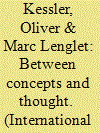

|
|
|
|
|
| Summary/Abstract |
This article advances the argument that the acceleration of practices introduced by digital technologies also impact key concepts of social theory. Digital technologies not only give rise to new concepts, but they also reconfigure our entire socio-political conceptual vocabulary. In particular, this acceleration reorganises the relationship between the spatial and temporal dimensions of political concepts. As a consequence, our spatially defined understanding of authority, hierarchy or relation underestimates the repercussions of shifting temporalities. This article pursues this shift from space to time and outlines how temporal relationality is gradually impacting the representations and images we live by.
|
|
|
|
|
|
|
|
|
|
|
|
|
|
|
|
| 2 |
ID:
105944
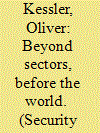

|
|
|
|
|
| Publication |
2011.
|
| Summary/Abstract |
While security and finance are certainly different social spheres, the fact that we can detect similar shifts in both points to the existence of something that precedes these 'realities'. If finance and security are said to be different, intertwined and related, the question then arises as to what it is that constitutes the differences and similarities between them. This article argues that further inquiry into the boundary between the two leads us to understand processes of securitization and financialization as constitutive processes by which actors, behaviours, practices or communications are considered to be economic or securitized. To capture processes of financialization, the article draws on systems theory in general and the concept of functional differentiation in particular.
|
|
|
|
|
|
|
|
|
|
|
|
|
|
|
|
| 3 |
ID:
147711
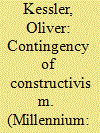

|
|
|
|
|
| Summary/Abstract |
This article argues that constructivism has not engaged with the concept of contingency sufficiently. While such noted constructivists as Onuf, Kratochwil, and Wendt often refer to ‘double contingency’, it is the concept of ‘norms’ rather than ‘contingency’ that is used to characterise constructivist theorising in International Relations (IR). In this article, I outline how moderate and radical constructivists differ in their take on norms and thereby establish how the problem of contingency is actually at the core of constructivist theorising. The discussion then shows how Kratochwil, Onuf, and Wendt have made use of double contingency while moderate constructivists have re-introduced the single actor to show how norms ‘cause’ action. The third part moves beyond the double contingency framework. By differentiating ‘the social’ from ‘society’, this section shows that a ‘third’ position can be identified. The concept of ‘triple contingency’ then could be a way ahead for the theoretical discussion on constructivism itself.
|
|
|
|
|
|
|
|
|
|
|
|
|
|
|
|
| 4 |
ID:
081457
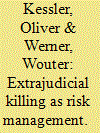

|
|
|
|
|
| Publication |
2008.
|
| Summary/Abstract |
This article analyses legal aspects of the `war on terror'. It argues that, by making recourse to a semantic of risk, danger and, in particular, precaution, the `war on terror' blurs crucial political and legal categories of public and private, of peace and war, of combatants and civilians, thus redefining the relationship between political responsibility, time and security. As a consequence, the extrajudicial killing of individuals becomes a form of risk management that takes place beyond established mechanisms of accountability.
|
|
|
|
|
|
|
|
|
|
|
|
|
|
|
|
| 5 |
ID:
145977
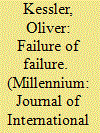

|
|
|
|
|
| Summary/Abstract |
This article explores the relevance of failure for constructivism. Starting from the constructivist focus on ‘language in use’, it conceptualises ‘failure’ as a concept rather than as an observed end or result. Instead of explaining or understanding some empirical failure, the primary questions now become how this concept is being used, and what performative consequences can be observed from this use. As such, the article’s first section develops three ‘uses’ or ‘notions’ of failure: failure as a ‘wrong representation’ of an objectively given reality; failure to produce an inter-subjective understanding that allows actors ‘to go on’; and failure as ‘mode of organisation’ that highlights its discursive grammar, or rules of formation, and the importance of social imaginaries grounding this process. The article’s second section then reconstructs the performance of ‘failure’ in the context of global finance and shows how the market, as a social imaginary, determines questions of authority and expertise. In doing so, this article points to the need for a socio-political economic analysis of economics, and the performance of its concepts, models, and assumptions.
|
|
|
|
|
|
|
|
|
|
|
|
|
|
|
|
| 6 |
ID:
084697
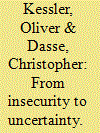

|
|
|
| 7 |
ID:
195394


|
|
|
|
|
| Summary/Abstract |
Before International Studies can confront the future, it needs to get a better grip on its past and present. The discipline lacks agreement on both its own name and the name of its object of study. More importantly, key concepts used to describe phenomena have changed continuously: no concept emerging in the 19th century has remained untouched, no envisioned future of the past could have prepared us for the present. Old concepts have been discarded, new ones adopted, and existing ones modified. This implies that any exercise in ‘futurology’ must necessarily come with an openness towards conceptual change, and that a key challenge for International Studies going forward will consist in matching our conceptual toolbox to an ever-changing world. The importance of conceptual change has until recently been neglected in the study of global politics. Thus, in this paper we start by presenting the empirical case for incorporating conceptual change by laying out key past and present conceptual changes in the international realm. We then move on to a presentation of conceptual history and the tools it provides us for grasping conceptual change, before discussing how to tackle conceptual developments when thinking about the future of global politics.
|
|
|
|
|
|
|
|
|
|
|
|
|
|
|
|
| 8 |
ID:
169782
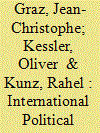

|
|
|
|
|
| Summary/Abstract |
This forum opens a debate that is long overdue: for far too long, the fields of international political sociology (IPS) and international political economy (IPE) have been standing apart. Discussions take place in different conference sections, in different networks that publish in different journals. Yet, this divide is surprising given that the two fields share similar trajectories, theoretical concerns, problématiques, and conceptual challenges. This forum starts exploring this shared terrain: we believe that there is no a priori reason to separate the sociocultural, the political and the economic when we aim at making sense of the world in any meaningful way. We propose that bridging the IPE-IPS divide has tremendous potential for the development of a socio-political economy analysis that, we believe, has two benefits. First, it allows for the opening of new empirical terrains or deepening and widening existing ones. Second, bringing IPE/S back together creates reflexive spaces for more holistic, embodied and contextualised conceptual innovation. The contributors to this forum show each in their own way such empirical and conceptual added value of moving beyond the IPE and IPS divide in order to develop what we call here a socio-political economy of the globe. They focus on various issues, such as the transformation of capitalism from an oil- to a data-dependent accumulation regime with the rising of the so-called ‘digital age’ (Chenou); the profound social, economic and political transformation triggered by urbanisation in the development world (Elias, Rethel and Tilley); emerging global risks and the neglected role of the insurance industry (Lobo-Guerrero); regional development-security nexuses (Lopez Lucia); and business power in climate change diplomacy (Moussu).
|
|
|
|
|
|
|
|
|
|
|
|
|
|
|
|
| 9 |
ID:
144066
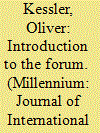

|
|
|
|
|
| Summary/Abstract |
This introduction positions The Status of Law in World Society in the context of Friedrich V. Kratochwil’s previous contributions to International Relations. It outlines how Kratochwil has replaced the rhetorical tradition that featured prominently in Rules, Norms and Decisions by practice theories and pragmatism in his new book. It then provides an overview of the nine new Meditations contained in The Status of Law, and introduces each contribution to this Forum.
|
|
|
|
|
|
|
|
|
|
|
|
|
|
|
|
| 10 |
ID:
117840
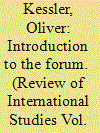

|
|
|
|
|
| Publication |
2012.
|
| Summary/Abstract |
In the last couple of years, Critical Realism has established itself as an alone-standing intellectual movement in International Relations (IR). It not only seeks to challenge the idea of the middle ground on which most of the more moderate versions of constructivist thought base their convictions, but it also seeks to provide own answers to basic scientific problems around the relationship between facts and values, causation and causality, or agents and structure. If one would want to characterise Critical Realist positions, one has to point to their attempted resurrection of ontology. Taking inspiration, in particular, from Bhaskar's Possibility of Naturalism and subsequent works, different strands of Critical Realism are tied together in their conviction that epistemology has had too much influence on scientific debates ever since Kant changed the structure of philosophical reasoning by asking how objects were determined by concepts rather than the other way round. The prevalent focus on epistemological questions is not only biased and asks the wrong questions, but it starts from false premises in the first place, as Wight and Patomäki once put it: every theory of knowledge must also logically presuppose a theory of what the world is like (ontology) for knowledge (epistemology) to be possible.
|
|
|
|
|
|
|
|
|
|
|
|
|
|
|
|
| 11 |
ID:
161631
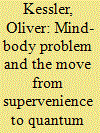

|
|
|
|
|
| Summary/Abstract |
At a time when most articles in International Relations (IR) go ‘micro’ and praise the promises of some new empiricism,1 Alexander Wendt shows with his Quantum Mind and Social Science: Unifying Physical and Social Ontology (hereafter Quantum Mind and Social Science) that Theory with a capital T is not dead at all. 2 This is a book that one not only reads, but one can actually study with much to think about. Wendt guides us through a world that is certainly fascinating, full of paradoxes, and mind-boggling insights.3 It is somewhat of a shame that for far too long, modern physics has not been part of our deliberations. At the same time, I think it is pretty fair to say that Wendt is not interested in fulfilling any pre-established expectations about what the ‘author’ Wendt stood for in IR so far.
|
|
|
|
|
|
|
|
|
|
|
|
|
|
|
|
| 12 |
ID:
080466
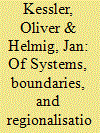

|
|
|
|
|
| Publication |
2007.
|
| Summary/Abstract |
For the analysis of regionalisation processes, this contribution calls for a mutual engagement between systems theory and critical geopolitics. Based on Luhmann's systems theory, the contribution proposes a framework based on the idea of a world society. This framework points to a changing mode of differentiation where there is an increasing overlap and collision between territorial and functional boundaries. Emphasising the concept of functional differentiation, a multiplicity of overlapping regional logics and forces appears where functional systems create their own 'image' of space. As a consequence, regions are not characterised by their physical or cultural boundaries but by collisions of different rationalities
|
|
|
|
|
|
|
|
|
|
|
|
|
|
|
|
| 13 |
ID:
117845
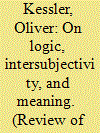

|
|
|
|
|
| Publication |
2012.
|
| Summary/Abstract |
The idea that our world is not just a mixture of unrelated incidents but shows some intelligible characteristics is probably the starting point of every analysis in International Relations (IR). We assume that what happens shows structure and significant connections of processes and flows. Unfortunately, opinions diverge soon thereafter: how does that assumed structure relate to our minds? Is it independent of our theories, cultural presuppositions, or opinions? What kind of objectivity can we hope for? Critical realists and radical constructivists seem to entertain different ideas about what the 'ontological status of reality' is and whether and how we can know about it. An intellectual encounter between Colin Wight and Friedrich Kratochwil has shown to what extent related questions about intersubjectivity, reference, and meaning touch upon questions about the logos. Interestingly enough, both agree that the 'classic' bivalent logic provides only an insufficient grounding for an adequate understanding of the world. Yet both are silent on providing reasons why this is the case. Hence, it might well be that constructivists and critical realists actually do share some reservation or critique.
|
|
|
|
|
|
|
|
|
|
|
|
|
|
|
|
| 14 |
ID:
081208
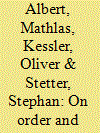

|
|
|
|
|
| Publication |
2008.
|
| Summary/Abstract |
This article begins from the observation that while communication is a widely used catch-phrase in current IR theorising, the very concept of 'communication' is still mainly treated in terms of simple sender-receiver models which do not sufficiently elaborate how the insights of the 'communicative turn' can be made fruitful for IR theorising. The argument is developed in three steps. First - particularly drawing on the work of Karl W. Deutsch - we identify those pockets in IR theory, namely conflict studies and theories of 'communicative action', in which 'communication' plays a considerable theoretical role. Second, it is claimed that placing 'communication' at the centre of any theory of IR requires taking full account of the theoretical consequences of the 'linguistic turn'. To develop this argument requires an examination of the often implicit notion of 'communication' in contemporary uses of speech act theory and symbolic interactionism in current IR theory. Such a move necessarily leads to the diagnosis that all social systems and orders of exchange, including international relations, are communicatively constituted. Finally, such a view enables a reconfiguration of the central problems of 'order' and 'conflict' in IR theory in an innovative fashion: while the problem of order can be restated not as the problem of establishing regularities and patterns but as a problem of disconnecting communications, the problem of conflict can be restated not as a problem of a disruption of communication but as a problem of continuing conflict communication.
|
|
|
|
|
|
|
|
|
|
|
|
|
|
|
|
| 15 |
ID:
144070
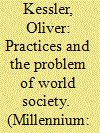

|
|
|
|
|
| Summary/Abstract |
This contribution explores The Status of Law in World Society by looking at the practice turn in particular. Without challenging Kratochwil’s interest in practices per se, this contribution poses two questions: first, it acknowledges that the ‘practice turn’ itself is, like every intellectual movement, ambiguous with conflicting trends and developments. One of these ambiguities, however, concerns the position of the observer. Leaving this position undefined, the practice turn transports this ambiguity into constructivism with important repercussions on what constructivists assume to know and where the boundaries of their possible critique are. Second, this contribution asks whether there is a conflict between an interest in practices and the question of order. In particular, the latter incorporates the question of the ‘third’ that Kratochwil acknowledges, but does not develop in more detail.
|
|
|
|
|
|
|
|
|
|
|
|
|
|
|
|
| 16 |
ID:
153668
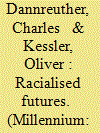

|
|
|
|
|
| Summary/Abstract |
This article explores the relationship between race and finance. By looking closer at risk, this article seeks to contribute to the literature in three ways: First, the concepts of risk and uncertainty need to be understood from a post-colonial perspective. Second, through a post-colonial reading of risk, we seek to develop a different concept of risk itself which emphasises its three qualities of de-humanisation, de-socialisation, and de-territorialisation. Last but not least, we propose to understand the post-colonial critique not only as a reconstruction of Europe’s past, as Dipesh Chakrabarty has named it, but locate it at the intersection of the present and the future: The post-colonial critique is enacted as soon as Europe’s future is imagined through risk.
|
|
|
|
|
|
|
|
|
|
|
|
|
|
|
|
| 17 |
ID:
108489
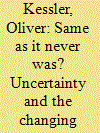

|
|
|
|
|
| Publication |
2011.
|
| Summary/Abstract |
International law has changed significantly since the end of the Cold War. As long as the international was thought to be populated by sovereign states predominantly, international law was conceived of as a means for peaceful dispute settlement. That is: the reference to state sovereignty not only divided public from private international law, but structured most of public international law itself; from the very definition of and associated rights and duties to the attribution of responsibility. With the emergence of the post-national constellation, a reduction of law to questions of states' practices is increasingly problematic. At the same time, the post-national constellation denotes more than just a structural shift in the world polity. It challenges established dogmas rooted in an individualistic philosophy of science and thereby calls for a different understanding of how the world is (made) known. What uncertainty has to offer is the provision of a different vocabulary detached from the state through which we can reconsider some changes in international law.
|
|
|
|
|
|
|
|
|
|
|
|
|
|
|
|
| 18 |
ID:
117039
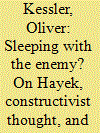

|
|
|
|
|
| Publication |
2012.
|
| Summary/Abstract |
The current economic crisis challenges the constitutive rules of global finance. Despite its various roots, dynamics, and consequences, the current reform debate is surprisingly limited in scope: it focuses on possible changes of Basle II and thus banking regulation only. This article suggests that the reason for this 'gap' can be found in the idea of asymmetric information. The idea that the asymmetric dispersion of information is the 'real' cause of the crisis is reiterated constantly in public documents. However, the argument rests upon two assumptions: that crises are exogenous to otherwise efficient and stable markets, and that finance is an autonomous field where the primary focus of the current reform can then concentrate on its laws. It is thought that it is enough to reform financial markets to stabilise the global economy. This article suggests that this belief is utterly misguided and argues that a more comprehensive picture of the current turmoil needs to abandon exactly these two assumptions. To pursue such an avenue, this article provids an interpretation of Hayek's social theory.
|
|
|
|
|
|
|
|
|
|
|
|
|
|
|
|
| 19 |
ID:
078736
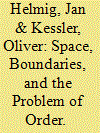

|
|
|
|
|
| Publication |
2007.
|
| Summary/Abstract |
The idea our global polity is chiefly divided by territorially organized nation-states captures contemporary constellations of power and authority only insufficiently. Through a decoupling of power and the state, political spaces no longer match geographical spaces. Instead of simply acknowledging a challenge to the state, there is the need to rethink the changing meaning of space for political processes. The paper identifies three aspects, a reconceptualization of the spatial assumptions that IR needs to address: the production of space, the constitutive role of boundaries, and the problem of order. With this contribution, we argue that one avenue in understanding the production of space and the following questions of order is by converging systems theory and critical geopolitics. While the latter has already developed a conceptual apparatus to analyze the production of space, the former comes with an encompassing theoretical background, which takes "world society" as the starting point of analysis. In this respect, nation states are understood as a form of internal differentiation of a wider system, namely world society
|
|
|
|
|
|
|
|
|
|
|
|
|
|
|
|
| 20 |
ID:
087323
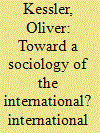

|
|
|
|
|
| Publication |
2009.
|
| Summary/Abstract |
To develop a sociology of the international, it is common in international relations (IR) to use a notion of inter-subjectivity defined as the space "in-between" individual actors. This approach is based on a parts/whole systems theory where common norms and values inscribed in international law not only create a "world society" but also provide for its social cohesion. Rooted in a parts/whole distinction, the very term of inter-subjectivity takes on a rather positivist meaning as the social quality of the international is then "measurable" and possibly even falsifiable by observing states' behavior. In the end, the inter-subjective quality of rules and norms is then ultimately reduced to the individual level. This article proposes a different avenue that breaks with the parts/whole distinction to emphasize the connectivity of communications. From this perspective, the notion of inter-subjectivity appears to be part of the problem rather than part of the solution and is thus replaced by the distinction between system and environment. The changing contours of international law are then decoupled from states' interests to emphasize the "relative autonomy" of the legal discourse as represented in its shifting paradox and programs.
|
|
|
|
|
|
|
|
|
|
|
|
|
|
|
|
|
|
|
|
|